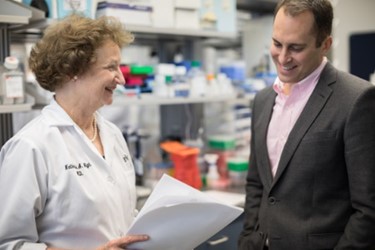Roche To Buy Spark Therapeutics For $4.8B

Swiss drug maker Roche entered into a definitive agreement Monday to acquire Philadelphia gene therapy pioneer Spark Therapeutics in an all-cash deal valued at $4.8B.
The proposed dea is expected to close during the second quarter. It doesn’t mean Spark is leaving the city — where it has made its home since 2013 and recently announced plans to expand.
Under the agreement, which has been unanimously approved by both company’s boards but still requires regulatory and shareholder approval, Spark will continue its operations in Philadelphia as an independent company within the Roche Group.
The deal calls for Roche to pay Spark stockholders $114.50 per share, which represents a premium of 122 percent over Spark’s Feb. 22 closing price.
A Spark spokeswoman said the company, which has about 370 employees, is not making executives available to comment on the proposed merger at this time because it is still early in the transaction process.
In a statement, Spark co-founder and CEO Jeffrey D, Marrazzo said Spark has built “unmatched competencies in the discovery, development and delivery” of genetic medicines. “But the needs of patients and families living with genetic diseases are immediate and vast. With its worldwide reach and extensive resources, Roche will help us accelerate the development of more gene therapies for more patients for more diseases and further expedite our vision of a world where no life is limited by genetic disease.”
Severin Schwan, CEO of Roche, said Spark has proven expertise “in the entire gene therapy value chain” and its technology may offer important new ways to treat serious diseases. “In particular,” Schwan said, “Spark’s hemophilia A program could become a new therapeutic option for people living with this disease. We are also excited to continue the investments in Spark’s broad product portfolio and commitment to Philadelphia as a center of excellence.”
Spark was spun out of Children’s Hospital of Philadelphia to commercialize the gene therapy advancements taking place in the lab of company co-founder Dr. Katherine High, who now serves as Spark’s president and chief scientific officer.
The company went public in 2015, raising $161M through its initial public stock offering — one of the largest biotech IPOs of the year.
In December 2017, the Food and Drug Administration granted marketing approval to Spark’s lead gene therapy candidate Luxturna, a one-time treatment for an inherited retinal disease caused by a genetic mutation that leads to blindness. Luxturna became the first gene therapy approved by the FDA to treat an inherited disease.
The European Commission approved Luxturna late last year, Spark licensed the European rights for Luxturna to Novartis.
Luxturna — which is priced at $425,000 per eye, making it one of the most expensive medicines in the market — generated sales of $27M for Spark last year.
The company’s pipeline of additional gene therapies includes a hemophilia B treatment it co-developed with Pfizer, which last year took over the development responsibilities for the product now in late-stage clinical testing.
Spark also has a hemophilia A gene therapy candidate in late-stage testing and products for Pompe disease and CLN2 disease, a form of Batten disease, in preclinical development.
Marrazzo has spoke often of the company’s commitment to remaining In Philadelphia to be close to CHOP and its scientific collaborators. The company has offices and its gene therapy manufacturing facility at 3737 along with offices in the FMC Tower at 2929 Walnut St.
In October, Spark Therapeutics unveiled plans to expand its research-and-development operations in West Philadelphia — and create about 500 new high-paying jobs over the next five years — by becoming a major tenant at Brandywine Realty Trust's $3B Schuylkill Yards development project with Drexel University. The company's existing offices are at 3737 Market St. Sparks expects to add 500 new jobs over the next five years.
About Roche
Roche, based in Basel, Switzerland, is a global company involved in both pharmaceuticals and diagnostics. It generated revenues of $56.8M last year, and has 94,000 employees and about 20 R&D sites worldwide. It operates in 100 countries. Among its products are the cancer drugs MabThera/Rituxan, Avastin and Hereptin.
Roche entered the hemophilia market in 2017 when the FDA approved its hemophilia A treatment Hemlibra, which generated sales of $23M last year and is expecting to become a $1B product.
Source: Roche
